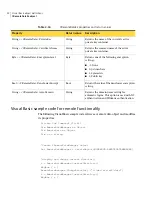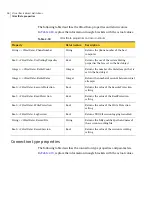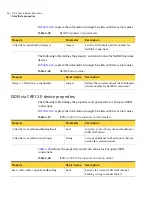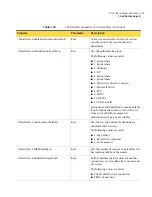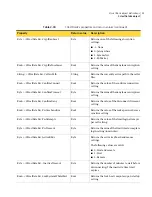
In
Table 2-17
, replace the information in angle brackets with the actual values.
Table 2-17
CHostData properties and parameters
Description
Parameter
Property
Sets the phone number of the host computer.
String
<CHostData>.PhoneNumber(String)
Sets the system dialing properties.
Bool
<CHostData>.UseDialingProperties(Bool)
Sets the number of redial attempts before
cancelling the call.
Integer
<CHostData>.RedialCount(Integer)
Sets the number of seconds to wait between
redial attempts.
Integer
<CHostData>.RedialDelay(Integer)
Sets the password on the host object for use
with the ExecuteProtection, ReadProtection,
and WriteProtection settings.
For security reasons, the pcAnywhere
Automation Server does not provide the ability
to read the password value. A password value
is not returned.
String
<CHostData>.Password(String)
Sets the requirement of a password to execute
the object. Set by Password.
Bool
<CHostData>.ExecuteProtection(Bool)
Sets the requirement of a password to view the
properties of the host object. Set by Password.
Bool
<CHostData>.ReadProtection(Bool)
Sets the requirement of a password to save
changes to the host object. Set by Password.
Bool
<CHostData>.WriteProtection(Bool)
Activates and deactivates session logging.
Bool
<CHostData>.LogSession(Bool)
Sets the fully qualified path and name to the
location of the file that records the active
session.
String
<CHostData>.RecordFile(String)
Activates and deactivates automatic session
recording.
Bool
<CHostData>.RecordSession(Bool)
Sets the password for the object. You can use
this property to refresh the local data copy of
the host object.
String
<CHostData>.ReadObject(String)
Sets the password for the object. Use this
property to create the host object or to write
changes that you have made to the host object.
String
<CHostData>.WriteObject(String)
37
Visual Basic object definitions
CHostData properties










